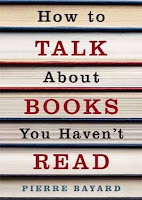
The book is called How to Talk about Books You Haven’t Read by Pierre Bayard, translated from French to English. (How could one pass up a book with this title up on the "What’s New" shelf at the British Institute?) The subject is something alluded to in the post about primary and secondary sources, which is how can one possibly read everything one is “supposed” to read? This author puts us at ease and says that you can’t, so don’t try and by the way, “supposed to" is something we need to work on because it’s making us ashamed and flustered – not good. Furthermore, it is okay to not read a lot of books, but still talk about them with confidence. What’s important is to know where books fit into the larger scheme of what he calls the collective library of all books.
The advice is a bit more subtle that it seems at first. Bayard’s real goal is to suggest that the highest goal is to transform your relationship with books from feeling burdensome (“I’m supposed to read this”) to being a source of inspiration for your own creativity. He states that talking about books itself is a highly creative activity and that it is important to do so to build your own story. A few sentences from the epilogue state this in so many words: “Becoming the creators of our own works is thus the logical and desirable extension of an apprenticeship in commenting on books we haven’t read. This creativity is one step along the path to self-conquest and to our liberation from the burden of culture, which may impede the existence of those who haven’t been trained in its mastery, and thus in the ability to bring life to their works.” An interesting concept.
a man after my heart! LOL. to think i used to love to read as a kid... what happened to me? oh the global communication. that's what happened.
ReplyDeletehow did i miss THIS post?